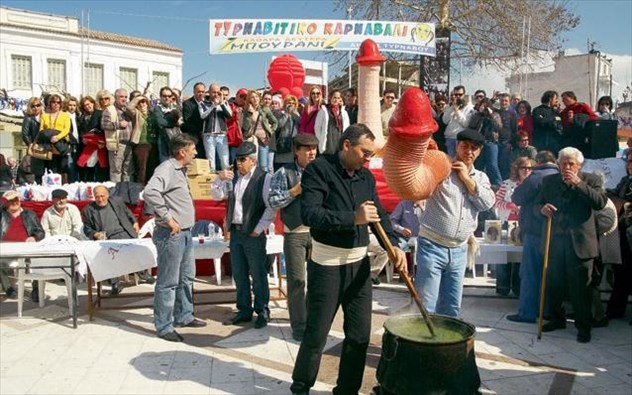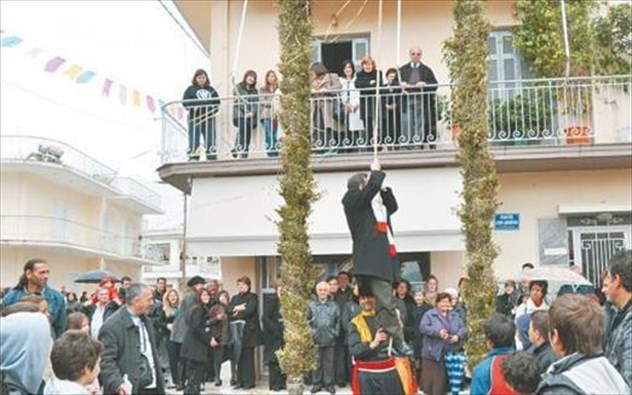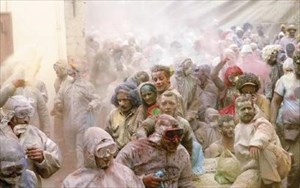Clean Monday marks the beginning of the forty days of Lent before Easter. This day is so named because Christians "clean" themselves spiritually and physically. According to tradition, fasting food is served on this day, and it is an official public holiday in Greece.
The traditional outdoor excursions on this day are called "koulouma" and they also include the custom of flying kites. If the weather is suitable, people go out, eat fasting food, dance round dances and have fun.
The celebration of "koulouma" varies in different regions of the country as each region has its typical and traditional customs but everywhere people entertain, having something to eat and drink, dancing round dances and singing.
Here are some of the customs associated with Clean Monday in different parts of Greece:
The custom of Aga of Mesta and other villages on the island of Chios
Many villages (Mesta, Pirgi, Litti, Olympia, Langada) each year observe the traditional custom of Aga, which dates back to the Ottoman rule and mocks the trials of the Turks.
Aga, the strict Turkish judge, is chosen by the villagers. The preparations for the custom begin in the morning and later Aga, riding a donkey, and the prosecutor go into the central square of the village, throwing confetti.
Based on the sentence everyone has to give money for the cultural association but sometimes the custom involves... hitting with a plastic bat.
"The people's court for immoral acts" in Karpathos

On Clean Monday Karpathos organizes the so-called "People's court for immoral acts", which represents the opportunity for purification and administration of justice at the beginning of Lent.
The defendants involve all those who behave indecently or challenge others with their deeds. They are taken to the local gendarmes called "dzafieti" who are to administer justice and to arrest the "perpetrators". The elders of the island undertake to judge the "sinners" through improvised jokes, thus marking the beginning of the feast.
The "kilts" of Naxos
Naxos revives elements of the cult of Dionysus such as the "ringers" and "kilts". On Clean Monday, the streets are full of men dressed in kilts (men’s long white skirt, part of the Greek national costume) and form groups, each of which has its own leader, the so-called standard-bearer. He bears the flag, which is a long stick with a coloured cloth tied on it. The groups go to the women in the neighbouring villages, and they all dance round dances in the main square to the accompaniment of violins and lutes (traditional Greek stringed instrument). The women in each village in turn treat the men with wine, pastries and dishes.
The "Bourani" custom in Tirnavo

In Tirnavo, Larissa area, the locals worship the god of fertility by drinking, singing, dancing round dances, carrying an artificial phallus and eating the traditional "Bourani" dish.
"Bourani" is a Turkish word meaning rice with vegetables (or rice with spinach) and today it is a traditional dish in the form of a soup made with spinach, nettle, and vinegar. It marks the beginning of the songs, round dances and biting jokes and teasing.
"Wallachian wedding" in Thebes
On Clean Monday, the area of Thebes observes the "Wallachian wedding" custom. This is a colourful wedding procession to the accompaniment of traditional musical instruments, which is a parody of a pastoral wedding with a "bride" dressed in different clothes.
The custom originated in 1830 when the shepherds (vlachs) from the regions of Macedonia, Epirus, Thessaly and Rumelia left their infertile land and sought fertile pastures in the south.
The execution of Sikou - an old woman - in Messina

The region of Kremala in Messina makes a reconstruction of the execution of Sikou, an old woman who was hanged in this place by order of Ibrahim Pasha. Then the "executioners" can "hang" every visitor on the gallows.
The same afternoon there are carnival platforms and dancing groups, and young and old people have fun.
"Flour war" in Galaxidi
 Galaxidi resembles a war zone on Clean Monday afternoon. Groups of local residents fight by throwing coloured powder and flour at each other. The custom has remained in history as a "flour war" and dates back to the "era of ships" in 1840. The participants gather in the square where the "war" with flour or soot begins. So, old clothes or a special plastic uniform are required.
Galaxidi resembles a war zone on Clean Monday afternoon. Groups of local residents fight by throwing coloured powder and flour at each other. The custom has remained in history as a "flour war" and dates back to the "era of ships" in 1840. The participants gather in the square where the "war" with flour or soot begins. So, old clothes or a special plastic uniform are required.
The list of customs on Clean Monday in Greece is long and includes the custom with the camel in Xanthi, that of the "monk" in Kalambaka, Drama, the "funeral of the mask" on the island of Zakynthos and many others.